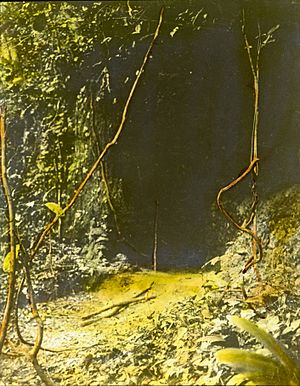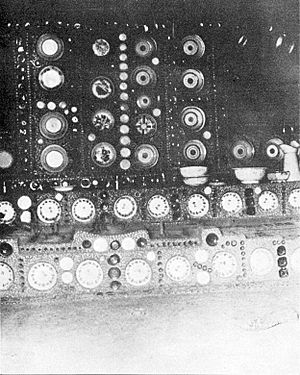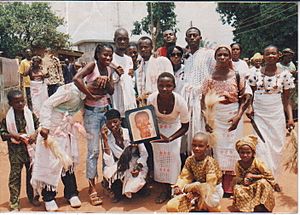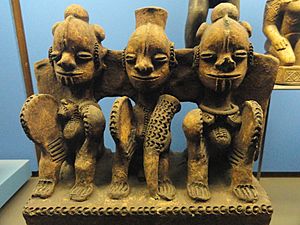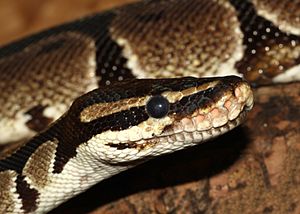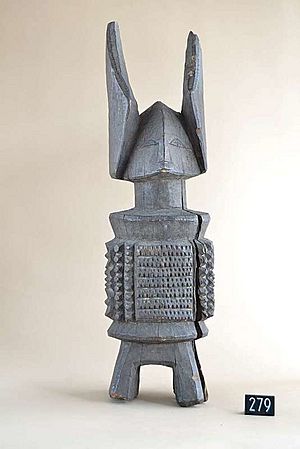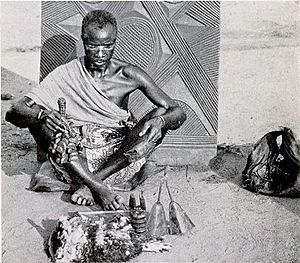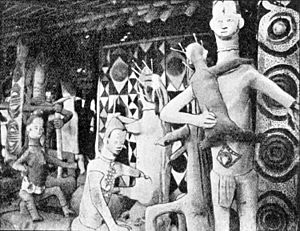Odinala facts for kids
Odinani or Odinala is the traditional belief system of the Igbo people in Nigeria. It's also known by names like Omenala or Omenana. These words describe the old Igbo way of life, where spirituality was a big part of everything.
Even though many Igbo people now follow Christianity, the old beliefs are still important, especially in villages. Odinani believes in many gods and spirits. There is one main god, Chukwu, from whom everything comes. Other gods and spirits, like Ala, Amadiọha, Anyanwụ, Ekwensu, and Ikenga, are seen as helpers or parts of Chukwu.
Below these main gods are smaller spirits called ágbàrà or árúsí. These spirits represent things in nature. People called Dibia (spiritual guides) and priests help connect with these spirits. They use a method called áfà (divination) to understand what the spirits want. Shrines for these spirits are found in communities, and smaller ones are in homes for honoring ancestors. Igbo people believe their ancestors live in a spirit world and can be contacted.
In the 20th century, when Christian missionaries came to Nigeria, the number of people practicing Odinani went down a lot. Some parts of Odinani mixed with Christianity. However, many traditional practices were seen as bad by missionaries. Today, you can still see parts of Igbo religion in harvest celebrations like the New Yam Festival and in masquerade traditions.
Some Igbo religious practices also spread to the Caribbean and North America during the Atlantic slave trade. For example, Igbo ọ́bị̀à became known as obeah in the West Indies.
Contents
What Does the Name Odinani Mean?
The word Ọdịnala comes from Igbo words meaning 'located within the land'. It refers to the beliefs and customs of the Igbo people. Many of their old laws and traditions were connected to their religion, like rules about sacred places. Because traditional laws are still recognized in Nigeria, some Igbo people mix these old beliefs with newer religions.
Main Beliefs of Odinani
Odinani believes in a powerful spiritual force that created everything. This force is called Chukwu. Chukwu is part of the invisible beings (ndi mmuo), which also include:
- Ala: The powerful earth goddess.
- Chi: A person's own guardian spirit.
- Ndichie: The ancestors.
- Mmuo: Smaller spirits.
There are also visible beings (ndi mmadu), like animals, plants, and natural elements. While people pray to various gods, spirits, and ancestors, no sacrifices or shrines are made directly to Chukwu. If a spirit is assigned to a person, it becomes their chi, like a personal guardian.
Odinani, like many traditional African religions, believes that everything in nature has a spirit. This includes worshipping guardian spirits, nature, and ancestors. People also believe in an afterlife. Ancestors are seen as a big part of life. They are thought to live in a spirit world and can bless or even cause problems for their living family members. Ancestors can give advice and good fortune. They might also ask for their shrines to be cared for.
Some experts describe the Igbo religion as "Monopolytheism." This means it has many distinct gods and spirits, but also one distant supreme force that created everything.
Your Personal Guardian Spirit: Chi
In Odinani, Igbo people believe that each person has a special spiritual guardian called Chi (or ḿmúọ́). This guardian is given to them at birth and stays with them throughout their life. Your Chi represents your fate and influences your successes, problems, and failures. The Igbo believe that your success in life depends on your Chi. No one can achieve more than what their Chi allows.
The idea of Chi is similar to a guardian angel in Christianity. Igbo culture also believes that people create their own destiny. The breath of life is in the heart, called óbì. A spiritual guide (Dibia) can help you find out about your Chi and how to keep it happy. Homes often have a small shrine to honor the Chi.
How the World is Organized
The Igbo people call the world and all living things in it ụ̀wà. This includes animals, plants, and even minerals, all of which have a special life force. They believe these things are connected to invisible forces in the spirit world.
Igbo beliefs show a balance between male and female forces. The world is divided into four parts, which match the four days of the Igbo calendar: èké, órìè, àfọ̀, and ǹkwọ́. These are seen as market days. The universe is thought of as overlapping dome-like spaces, called élú nà àlà (sky and earth).
The number four is very important and sacred to the Igbo. The four days of the week are also linked to the four main directions:
- èké: East
- órìè: West
- àfọ̀: North
- ǹkwọ́: South
Some communities believe èké is the most important of these spirits, while others prioritize órìè and ǹkwọ́. The universe itself is divided into four main parts:
- Okike: The act of creation.
- Alusi: The lesser gods.
- Mmụọ: The spirits of ancestors and other beings.
- Uwa: The world itself.
Justice and Fairness
The concept of Ọfọ and ogụ́ is about fairness and justice. It protects anyone who is wrongly accused, as long as they are innocent. Only someone who is truly in the right can call upon Ọfọ-na-Ogụ́ in prayer. If someone lies, they might face the anger of Amadioha, the god of thunder.
Kola nut is used in ceremonies to honor Chukwu, Chi, Arusi, and ancestors. It's also used to show innocence, along with pouring drinks on the ground (libations). Igbo people often make clay altars and shrines for their gods. These can sometimes look like people, like the wooden statues of Ikenga.
Life After Death and Rebirth
Igbo people traditionally believe in an afterlife in the spirit world. Deceased ancestors live there and can influence the living world and their families. Ancestors are seen as protectors of their family line. Sometimes, ancestors might be reborn into their families. This is called ilọ-uwa.
Reincarnation doesn't happen often, but it can occur if a deceased person can't enter the spirit world. Unlike in Hinduism, humans can only be reborn as humans. Families might ask fortune-tellers to find out if a child carries the soul of an ancestor. The child might even be named after that relative.
Ogbanje: A Special Kind of Spirit
An ọgbanje is believed to be a spirit that causes trouble for a family. In old stories, an ọgbanje child would be born, then die young, and be reborn to the same mother, repeating the cycle and causing sadness. This cycle could last for minutes, hours, days, or years.
To stop an ọgbanje, people believed they had to find its Iyi-uwa. This was a special stone buried in a secret place. The Iyi-uwa was thought to be the ọgbanje's way of returning to the human world. A priest would dig up and destroy the stone. After the stone was destroyed, or if the mother successfully gave birth to another baby, the child was believed to no longer be an ọgbanje.
Important Gods and Spirits
The Arusi (also called Arushi, Anusi, or Alusi) are important gods in Odinani. They all come from Ala, the Earth goddess. Each Arusi is responsible for a specific part of nature or an idea. According to Igbo beliefs, these gods have their own special purpose.
Some well-known male Arusi include:
- Amadioha: The God of Thunder and Lightning.
- Ikenga: The horned god of Fortune and Industry.
- Agwu: The God of Divination and Healing.
- Njoku Ji: The God of Yam.
- Ogbunabali: The God of Death.
Arusi spirits appear in natural things, and their shrines are often found in forests, usually around specific trees. People place objects like cloth or statues at these shrines to help with worship. These gods are sometimes seen as powerful and unpredictable, so people approach their shrines carefully. Priests are usually in charge of taking care of most shrines.
Ala: The Earth Goddess
Ala means 'earth' and 'land' in Igbo. She is the female earth spirit who looks after morality, fertility, and the spirits of dead ancestors. Ancestors are believed to be stored in her womb in the underworld. Ala is the most important and worshipped Arusi. Almost every Igbo village has a shrine for her called íhú Ala, where important decisions are made.
Ala is connected to all parts of human life, including festivals and offerings. She represents fertility and things that bring life, like water, stone, and plants. She is also a symbol of good behavior and upholds Igbo customs (omenala). The land itself is considered holy because it is the body of Ala. This makes her the main authority for laws.
Things that are forbidden and offend Ala include murder, suicide, and stealing. In some places, the birth of twins was also seen as an offense. People who take their own lives are not buried in the ground. This is to avoid further offending the land.
Ala is also the foundation on which the sky rests. When a child is born, their umbilical cord is often buried under a tree. This symbolizes the child's first connection to the family's land. In some areas, like Nri, the royal python (éké) is seen as a sacred messenger of Ala. It is believed to bring good luck when found in a home. Killing a python is forbidden in these places.
Amadioha: God of Thunder and Justice
Amadioha is the Arusi of justice, thunder, lightning, and the sky. He is also known as Kamalu or Kamanu in some areas. His color is red, and his symbol is a white ram. Amadioha represents the will of the people and is often linked with Anyanwu (the sun deity).
He is the expression of divine justice. People swear oaths by him, and he is believed to strike down those who lie with thunder and lightning. Amadioha shrines are found across Igboland. His main shrine is in Ozuzu. His special day is Afọ, the second market day. In special houses called Mbari, Amadioha is shown next to Ala as her partner.
Ikenga: Spirit of Strength and Success
Ikenga means 'place of strength'. It is an Arusi and a special figure for men, representing their right hand and success. Men who own an Ikenga sculpture see it as key to their personal power and achievements. Ikenga is a source of wisdom.
The image of Ikenga combines a person's chi (personal god), their ancestors, their right hand (aka Ikenga), and their power (ike). It is activated through prayer and offerings. Ikenga helps balance a person's individual goals with their family duties. It also connects free will and hard work with destiny. Ikenga sculptures help people reflect and meditate on their personal journey.
If a person works hard but doesn't succeed, their Ikenga is said to have 'fallen'. This is a sign of danger. If meditation doesn't help, the sculpture might be 'thrown down' and broken. A new one is then carved to replace it. Ikenga figures can be small or large, and they can look like humans or be more abstract. They are symbols of success and personal achievement. Men usually own Ikenga, but sometimes women of high standing do too. When a man dies, his Ikenga is broken in two. One piece is buried with him, and the other is destroyed.
Ekwensu: Spirit of Change and War
Ekwensu was a spirit skilled in bargaining and trade. Praying to Ekwensu was believed to help people win negotiations. As a force of change and chaos, Ekwensu also represented the spirit of war among the Igbo. Warriors would call upon him during conflicts. During peacetime, he was banished to prevent bloodshed.
Ekwensu was known for bringing violence and making people angry. He is also seen as a spirit that can bring bad luck. Among Christian Igbo people, Ekwensu is often compared to Satan. Some Igbo towns hold Ekwensu festivals to celebrate military success and show off wealth.
Mmuo and Other Spirits
Mmụọ is a general term for many smaller gods and spirits that appear in nature. Female mmụọ live in earth and water, while male mmụọ live in fire and air. Some mmụọ are linked to unusual human behaviors. These spirits can be unpredictable and sometimes dangerous.
Other local gods exist across Igboland, such as:
- Njoku Ji: The yam and fire god, overseeing farming.
- Idemili: The female water spirit who supports the waters.
- Mbatuku: The 'bringer of wealth'.
There are also evil wandering spirits of wrongdoers called ogbonuke.
Some examples of Mmuo are:
- Mbatuku: Spirit of wealth.
- Ikoro: Drum spirit.
- Ekwu: Spirit of the home.
- Imo miri: River spirit.
- Okwara-afo: God of trade for the Nkwerre people.
- Aju-mmiri: Sea-goddess of prosperity and fertility in Nkwerre.
- Ogbuide: Water goddess linked to the Oguta people.
- Urashi and Enyija: River gods.
- Ezenwaanyi/Owummiri: Female Water Spirit, like a Mermaid.
Important Practices
Dibia: Spiritual Guides
Dibia are spiritual guides who connect the human world with the spirit world. They act as healers, teachers, and advisors. People often go to them for help at the shrine of a community's main god. The word Dibia means 'professional' or 'master' of 'doctoring' or 'sciences'.
Dibia are believed to be chosen for spiritual work. They can see the spirit world and understand messages from it. They can also see people's spiritual problems. They are given the power to identify any god by name and know how to make them happy. Dibia are thought to have power over water, fire, or plants. For example, a Dibia with power over plants might become a herbalist, knowing which plants have healing benefits. Dibia can partly enter the spirit world and show this by rubbing chalk on half of their face.
Afa Divination: Finding Answers
Divination in Igbo is called ígbá áfà or áhà, meaning 'to name'. This is because the diviner can identify the cause of problems. The Dibia, or ogba afa (interpreter of afa), is seen as a master of secret knowledge. Igba afa helps people find out why bad things are happening.
The diviner interprets messages from the spirit world (àlà mmuọ) by throwing special seeds, cowries (shells), and beads. They might also use a divination board. This way, the diviner is believed to have special sight. Animals like white goats, white rams, tortoises, and male wall geckos are important in divination and sacrifices.
Honoring Ancestors
Ndebunze or ndichie are the spirits of deceased ancestors. They are believed to live in the spirit world (àlà mmúọ́). In Odinani, ancestors are seen as invisible members of the community. Their role, along with Ala, is to protect the community from diseases and problems like famine. Ancestors also helped chi look after people.
Shrines for ancestors were usually made in the main house of the family leader. The male head of the household is responsible for honoring male ancestors with offerings. This helps the living stay connected with the dead. Only a family leader whose father has passed away can honor ancestors. Female ancestors were honored by female family leaders.
Kola Nut Ceremonies
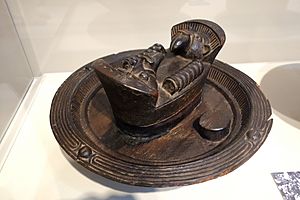
Kola nut (ọ́jị̀) offerings and prayers are very important. They can be done alone or in a group. During the prayer, a person speaks to their personal god (chi), other gods (alusi), and their ancestors. These kola nuts are kept in a special round bowl called ọ́kwá. The bowl often has a small section for spices like alligator pepper.
The kola nut ceremony is used to welcome visitors into a home. After the prayer, the person leading the ceremony shares pieces of the kola nut with everyone. This is called ị́ké ọ́jị̀. Kola nuts are usually broken by hand, but knives are now sometimes used. If a kola nut has three parts, it is considered very lucky and a sign of bravery in some communities. A popular saying is: O wetalu oji wetalu ndu — 'one who brings kola brings life'. This shows how important the kola nut ceremony is.
Special Buildings
Mbari Houses
In a small area near Owerri, there is a tradition of building special monument houses called ḿbàrí. These are mainly dedicated to the ágbàrà Àlà (a specific spirit of Ala) for the community. The name ḿbàrí means 'festival of life'. These shrines usually have four columns and a central arch. Around the columns are figures of gods, spirits, and scenes from human life. The whole building is made from clay.
These houses are built when a god asks for it, usually because a diviner says the god feels ignored. If a community has a string of bad events, it might be linked to an unhappy god. So, an mbari is built. After it's finished, a feast is held, and the community comes to see the expensive mbari. An mbari house is not a place for regular worship. It is left to slowly fall apart and return to nature, which is symbolic of Ala.
Uto Pyramids
Before the 1900s, circular stepped pyramids were built to honor Ala in the town of Nsude. In 1935, ten of these clay or mud pyramids still existed. The base of a pyramid was about 60 feet around and 3 feet high. The next level was smaller, and so on, until it reached the top. These structures were temples for the god Ala/Uto, who was believed to live at the top. A stick was placed at the very top to show where the god lived. These pyramids were built in groups of five, side by side. Because they were made of clay, they needed to be rebuilt regularly.
See also
 In Spanish: Odinani para niños
In Spanish: Odinani para niños
- Ch'i (term in Chinese religions)
- Godianism
- Igbo culture
- Ibo loa
 | Delilah Pierce |
 | Gordon Parks |
 | Augusta Savage |
 | Charles Ethan Porter |


